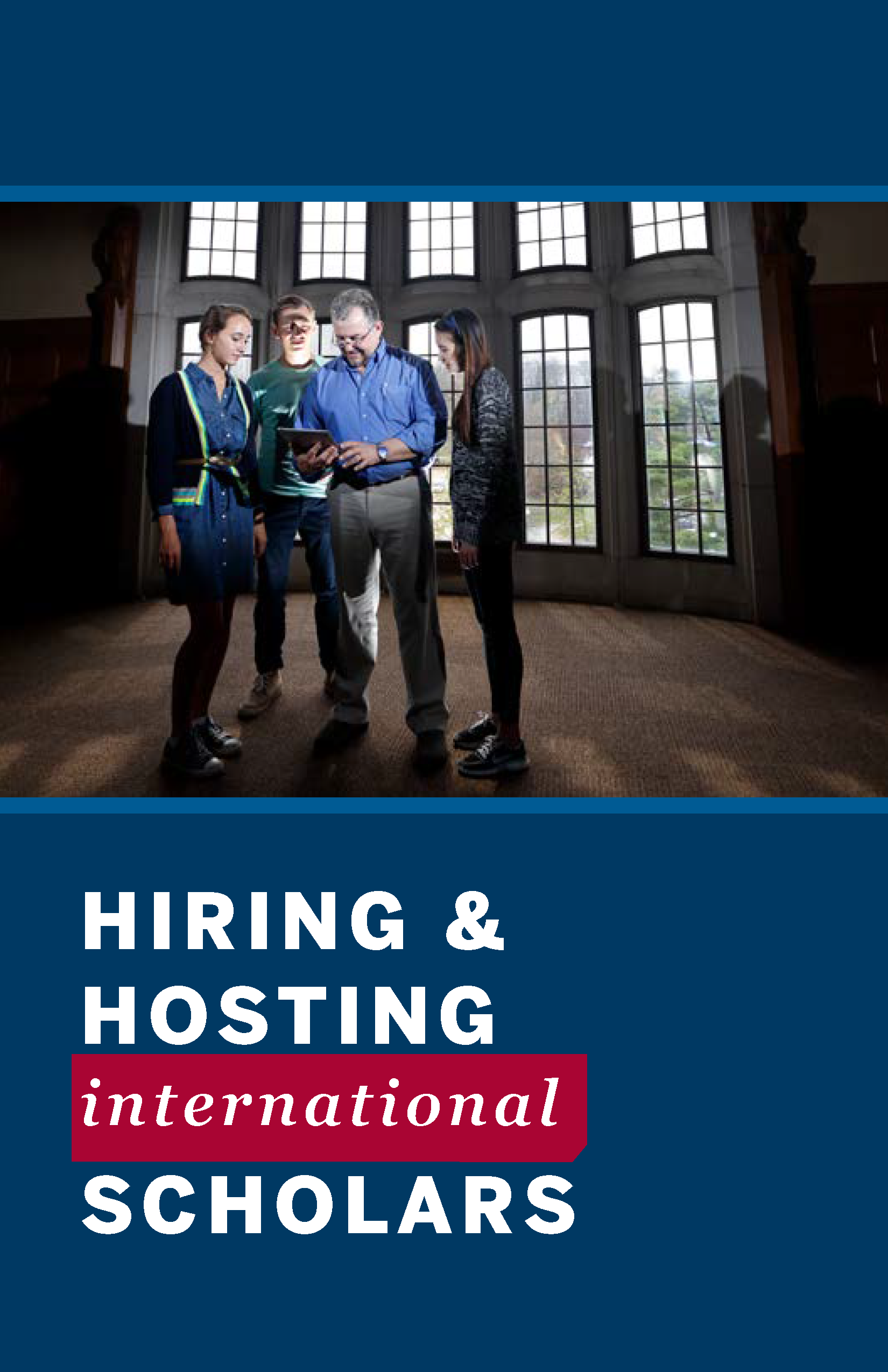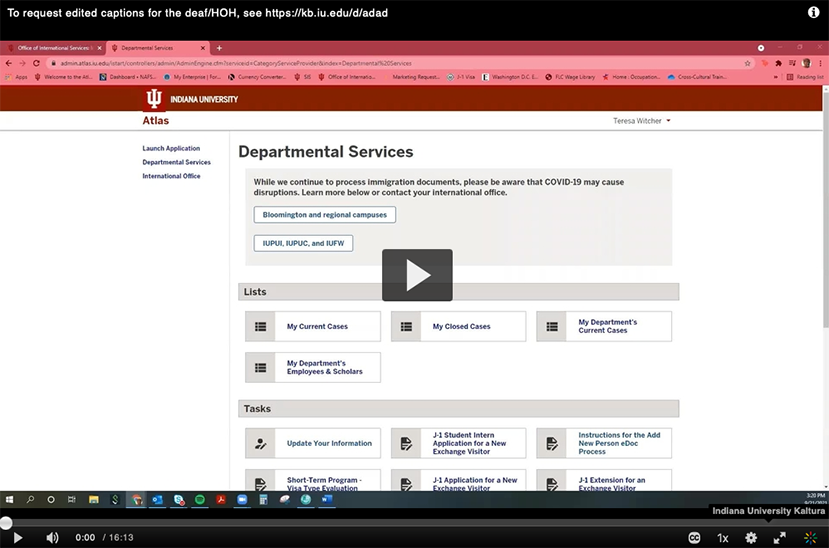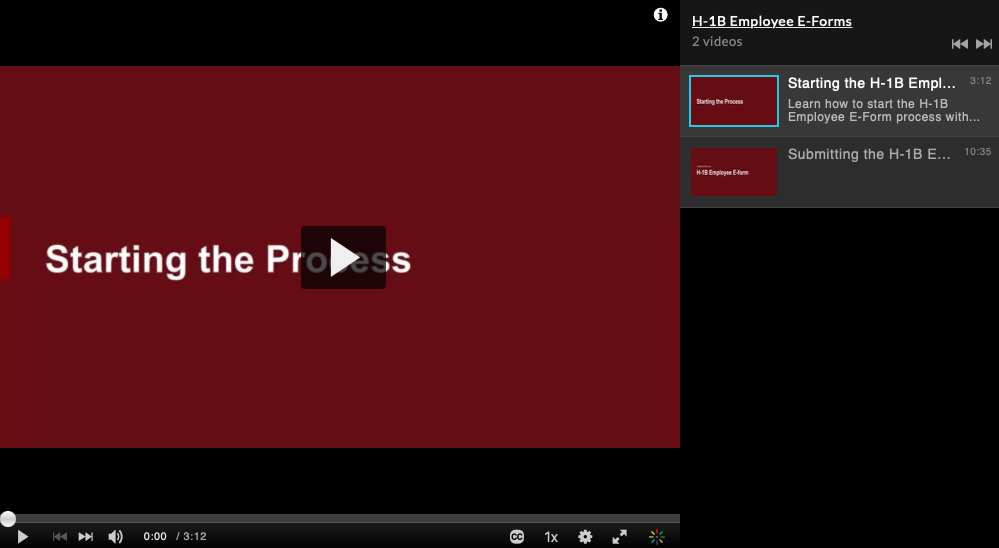When should I contact OIS?
As soon as you can. Each visitor’s circumstances are different. Some invitations can be offered right away without additional documentation, while others require applications, visa interviews at an embassy, and additional time for security clearances and travel. Processing times vary based on visa category and country. If the visitor is already in the United States, he or she may be able to visit on the current status or may need to change or transfer the status to IU. Contact us and we’ll tell you the best way to proceed.
When can my visitor start at IU?
That depends on the processing time for your visitor’s visa, and processing times vary based on visa category and country.
To request J-1 status on behalf of a new or current foreign scholar, your department must submit an electronic request (e-form) through Atlas. We request that you submit the e-form at least three months before the scholar’s start date to allow for OIS processing, mailing, obtaining a visa, and making flight and living arrangements.
Learn about J-1 status
Likewise, your department must submit an Atlas e-form to request H-1B status for a new or current international employee. We ask that you submit the e-form at least two months before the employee’s start date.
Learn about H-1B status
How long will my visitor be at IU?
Different visa categories allow different durations of stay. Visa type will be one indication of how long the visitor can be at IU.
What Is the purpose of the visit?
Again, there are many options. If the visitor intends to be primarily a student, for example, they will apply through the international admissions process. Guest lecturers and conference speakers might qualify to be short-term visitors. An artist who is coming to IU to perform may already have a visa status that allows a guest performance, or the university may need to file a petition for the performer. Researchers or faculty members may need to have their host department apply for them to be J-1 exchange visitors.
What is the visitor’s field of study or research?
Visitors in certain subjects may be subject to security checks that can delay visa processing and the visitor’s arrival at IU. J-1 exchange visitors in certain disciplines may be subject to the two-year home residency requirement.
What are the position’s requirements?
Some visa types require that the position, visitor, or both have a minimum degree.
How will the visitor be funded?
The type of funding may determine the most appropriate visa category. Will funding come from IU, the employer or government in the visitor’s home country, personal funds, or sponsorship by a third-party organization such as the Fulbright Program?
Some visa categories require the department to fund the position, and some require a wage determination set by the Department of Labor. If the visitor will be self-supported, the IU department will need to provide documentation that the visitor has funding available in a bank account.
Where is the visitor from?
Some visitors may be eligible for the Visa Waiver Program, and there are special visa categories for international visitors from Canada, Mexico, Chile, Australia, and other countries. The visa wait time is longer in some places because of high numbers of applicants or longer administrative processing times.
Will any dependents join the visitor here?
Dependents include spouses and unmarried children who are under the age of 21. Does the spouse want to work in the United States? Some visa categories allow dependents to apply for work authorization, and others don’t. Does the visitor need to arrange schooling or child care for any children?
Has the visitor been in the United States before?
If so, in what visa status? Previous visits to the United States can, in some cases, affect the visitor’s ability to obtain certain types of visas and re-enter the country.
Will the visitor do any other traveling?
Will the visitor be lecturing at any other American universities that may require authorization in advance from OIS? Will the visitor need to go abroad and return to finish work at IU? If so, he or she may need travel authorization from OIS.
How will the visitor get here?
Will you arrange and/or pay for the flight, or will the visitor need to make all arrangements? Will you send someone to pick the visitor up at the airport, will you arrange and/or pay for limo or shuttle service, or will the visitor have to find his or her own way?
Where will the visitor live?
Will you arrange and/or pay for a hotel or on-campus housing? Will you help the visitor find off-campus housing? Or will the visitor be expected to make all arrangements? See our information about housing.
What university services with the visitor need?
Will the visitor need access to IU computers, email, and libraries? Will the visitor need a Crimson Card? If so, you need to complete the Add New Person e-doc (to generate a university ID number) and the Hire e-doc (to appoint the scholar and give him or her access to get the ID card, email account, etc.). These e-docs are in HRMS.
Will the visitor need to open a U.S. bank account?
If so, will you take the visitor to a local bank? See our information about banking.
How will the visitor navigate the IU campus and city?
Will someone from your department be able to escort the visitor to OIS, show him or her around campus, and take him or her around town to look for housing, set up a bank account, and shop for groceries? Will the visitor want to drive, bike, or use public transportation? See our information about transportation.
How will the visit be structured?
You should clearly communicate the working conditions and expectations of the visit to the scholar before arrival. Will your department have private or shared office space for the visitor? Will you reserve space at one of the IU libraries for the visitor? Will the visitor be expected to find his or her own space to work? Will you expect the visitor to work during regular business hours or make his or her own hours? Will the host faculty meet regularly to collaborate with the visitor, or will they meet only occasionally to check in on progress?
How will the visitor communicate with others?
Will the visitor need a phone in the United States? Will he or she need computer and email access? Will he or she have access to these things within the department, or will he or she need to arrange for a mobile phone and home Internet service?
How will health insurance and health needs be addressed?
Some visa categories require health insurance while the visitor is in the United States. Will your department pay for health insurance, or will the visitor be expected to pay? Will someone in the department be available to take the visitor to the doctor or hospital if needed? See our information about health and insurance.




